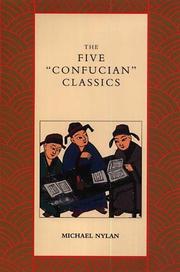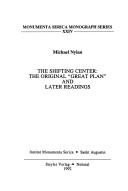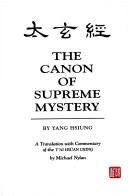| Listing 1 - 10 of 38 | << page >> |
Sort by
|

ISBN: 128172243X 9786611722432 0300130333 9780300130331 9781281722430 9780300081855 0300081855 9780300212006 0300212003 6611722432 Year: 2001 Publisher: New Haven: Yale university press,
Abstract | Keywords | Export | Availability | Bookmark
 Loading...
Loading...Choose an application
- Reference Manager
- EndNote
- RefWorks (Direct export to RefWorks)
The Five Classics associated with Confucius formed the core curriculum in the education of Chinese literati throughout most of the imperial period. In this book Michael Nylan offers a sweeping assessment of these ancient texts and shows how their influence spread across East Asia. Nylan begins by tracing the formation of the Five Classics canon in the pre-Han and Han periods, 206 B.C. to A.D. 220, revising standard views on the topic. She assesses the impact on this canon of the invention of a rival corpus, The Four Books, in the twelfth century. She then analyses each of the Five Classics, discussing when they were written, how they were transmitted and edited in later periods, and what political, historical, and ethical themes were associated with them through the ages. Finally she deliberates on the intertwined fates of Confucius and the Five Classics over the course of the twentieth century and shows how their contents are relevant to much newer concerns.
BODY, MIND & SPIRIT / I Ching. --- Wu jing. --- 五經 --- Wu ching --- Woo king --- Five Classics --- Ogyŏng --- Wu jing quan yi --- 五经 --- S12/0300 --- 299.512 --- 299.512 Confucianisme. Mencius. I Ching --- Confucianisme. Mencius. I Ching --- China: Philosophy and Classics--Confucian classics --- Philosophy, Confucian.
Book
ISBN: 9781942130130 1942130139 Year: 2018 Publisher: New York Zone Books
Abstract | Keywords | Export | Availability | Bookmark
 Loading...
Loading...Choose an application
- Reference Manager
- EndNote
- RefWorks (Direct export to RefWorks)
In 'The Chinese Pleasure Book', Michael Nylan takes up one of the most important themes in Chinese thought: the relation of pleasurable activities to bodily health and the health of the body politic. In a notable contrast to Western writings on the subject, early Chinese writings oppose pleasure not with pain but with insecurity. All assume that it is right and proper to seek and take pleasure, as well as short-term delight, and all are equally certain that long-term relational pleasures are more easily sustained-as well as potentially more satisfying and less damaging. The pleasures that become deeper and more ingrained over the long term, as one invests time and effort into their cultivation, include friendship and music, sharing with others, developing integrity and greater clarity, reading and classical learning, and going home. Nylan explores each of these fields of activity through the early sources (mainly fourth century BC to the eleventh century AD), providing new translations for both well-known and seldom-cited texts.
Philosophy, Chinese --- Emotions (Philosophy) --- Pleasure --- Senses and sensation --- Mind and body

ISBN: 3805002939 Year: 1992 Publisher: Nettetal Steyler Verlag
Abstract | Keywords | Export | Availability | Bookmark
 Loading...
Loading...Choose an application
- Reference Manager
- EndNote
- RefWorks (Direct export to RefWorks)
Book
Year: 1985 Publisher: Ann Arbor University microfilms international
Abstract | Keywords | Export | Availability | Bookmark
 Loading...
Loading...Choose an application
- Reference Manager
- EndNote
- RefWorks (Direct export to RefWorks)
Year: 1993
Abstract | Keywords | Export | Availability | Bookmark
 Loading...
Loading...Choose an application
- Reference Manager
- EndNote
- RefWorks (Direct export to RefWorks)
Book
ISBN: 9780521852975 0521852978 Year: 2010 Volume: 67 Publisher: Cambridge: Cambridge university press,
Abstract | Keywords | Export | Availability | Bookmark
 Loading...
Loading...Choose an application
- Reference Manager
- EndNote
- RefWorks (Direct export to RefWorks)
Geschichte 221 v. Chr. -220. --- China --- Chine --- History --- Antiquities. --- Histoire --- Antiquités --- Antiquities --- S04/0520 --- S04/0500 --- S17/0214 --- China: History--Han: 206 B.C. - 220 A.D. --- China: History--Ancient (Pre-Han and Han, incl. Sima Qian) --- China: Art and archaeology--Archaeology China: Pre-Han and Han --- Antiquités --- China: History--Han: 206 B.C. - 220 A.D --- China - History - Qin dynasty, 221-207 B.C. --- China - History - Han dynasty, 202 B.C.-220 A.D. --- China - Antiquities

ISBN: 0791413950 0791413969 9780791413968 Year: 1993 Publisher: Albany State university of New York press
Abstract | Keywords | Export | Availability | Bookmark
 Loading...
Loading...Choose an application
- Reference Manager
- EndNote
- RefWorks (Direct export to RefWorks)
S12/0224 --- S13A/0450 --- Cosmology, Chinese --- Divination --- -#SML: Paul Serruys --- Chinese cosmology --- Augury --- Soothsaying --- Occultism --- Worship --- China: Philosophy and Classics--Chinese philosophy: Han --- China: Religion--Astrology, fortune-telling, physiognomy, occultism, numerology, divination --- Cosmology, Chinese. --- #SML: Paul Serruys
Book
ISBN: 9780385510691 0385510691 Year: 2010 Publisher: New York Doubleday
Abstract | Keywords | Export | Availability | Bookmark
 Loading...
Loading...Choose an application
- Reference Manager
- EndNote
- RefWorks (Direct export to RefWorks)
The profound influence of Confucius across the ages--his teachings of personal and government morality, justice, and appropriateness in social relationships--is the subject of this unique history.
Confucianism. --- Konfuzianismus. --- Rezeption. --- Rezeptionsforschung. --- Confucius. --- Biographieforschung. --- Kong, Qiu, --- Kong, Qiu. --- Kong. --- China. --- Confucianism --- 299.512 --- 299.512 Confucianisme. Mencius. I Ching --- Confucianisme. Mencius. I Ching --- Religions --- Konfuzius --- Kung tzu --- Kong zi --- Kongzi
Book
ISBN: 0295804688 9780295804682 9780295992891 0295992891 Year: 2013 Publisher: Seattle : University of Washington Press,
Abstract | Keywords | Export | Availability | Bookmark
 Loading...
Loading...Choose an application
- Reference Manager
- EndNote
- RefWorks (Direct export to RefWorks)
Winner of the Aldo and Jeanne Scaglione Prize for a Translation of a Scholarly Study of Literature, sponsored by the Modern Language AssociationExemplary Figures (sometimes translated as Model Sayings) is an unabridged, annotated translation of Fayan, one of three major works by the Chinese court poet-philosopher Yang Xiong (53 BCE-18 CE). Yang sought to "renew the old" by patterning these works on earlier classics, drawing inspiration from the Confucian Analects for Exemplary Figures. In this philosophical masterwork, constructed as a dialogue, Yang poses and then answers questions on philosophical, political, ethical, and literary matters. Michael Nylan's rendering of this text, which is laden with word play and is extraordinarily difficult to translate, is a joy to read-at turns wise, cautionary, and playful.Exemplary Figures is a core text that will be relied upon by scholars of Chinese history and philosophy and will be of interest to comparativists as well.
Ethics --- Philosophy, Chinese. --- Ethics, Chinese --- Chinese philosophy
Book
ISBN: 0585088381 9780585088389 1438414862 Year: 1994 Publisher: Albany, N.Y. State University of New York Press
Abstract | Keywords | Export | Availability | Bookmark
 Loading...
Loading...Choose an application
- Reference Manager
- EndNote
- RefWorks (Direct export to RefWorks)
Divination --- Cosmology, Chinese. --- Cosmology, Chinese --- Social Sciences --- Parapsychology & Occult Sciences --- Chinese cosmology
| Listing 1 - 10 of 38 | << page >> |
Sort by
|

 Search
Search Feedback
Feedback About UniCat
About UniCat  Help
Help News
News